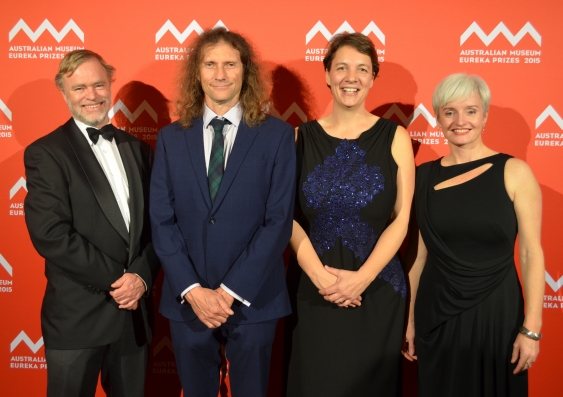UNSW Science shines at Eurekas
UNSW scientists working on quantum computing, marine science and threatened ecosystems have won three prestigious Australian Museum Eureka Prizes – for leadership, science communication, and environmental research.
UNSW scientists working on quantum computing, marine science and threatened ecosystems have won three prestigious Australian Museum Eureka Prizes – for leadership, science communication, and environmental research.

Deborah Smith
UNSW Media
9385 7307 or 0478 492 060
deborah.smith@unsw.edu.au
UNSW scientists have won three prestigious Australian Museum Eureka Prizes – for leadership, science communication, and environmental research.
Scientia Professor Michelle Simmons, Director of the ARC Centre of Excellence for Quantum Computation and Communication Technology, was awarded the CSIRO Eureka Prize for Leadership in Science “for her leadership, passion, commitment and energy devoted to advancing the field of quantum computing in Australia”.
As head of a multidisciplinary, cross-institutional team of 180 researchers, Professor Simmons has helped position Australia at the forefront of an international race to build a large-scale quantum computer based in silicon.
She has developed the world’s smallest transistor, built of one single atom, as well as the world’s narrowest conducting wires in silicon. Among her many accolades, Professor Simmons, of the School of Physics, was named NSW Scientist of the Year in 2012 and was awarded an Australian Research Council Laureate Fellowship in 2013.
Last year, she joined the likes of Stephen Hawking and Albert Einstein as an elected member of the American Academy of Arts and Science. She was made the inaugural editor-in- chief of the first Nature Partner Journal based in Australia, npj Quantum Information, and also helped secure a $5 million investment in quantum computing from the Commonwealth Bank of Australia.
Executive Director and CEO of the Australian Museum, Kim McKay AO, congratulated Professor Simmons and her team for “ensuring Australia’s success in what will become a multi-billion dollar industry”.
The Eureka Prizes, dubbed the Oscars of Science, were presented at a gala dinner in the Sydney Town Hall last night.
Professor Emma Johnston, of the School of Biological, Earth and Environmental Sciences, was awarded the Department of Industry and Science Eureka Prize for Promoting Understanding of Australian Science Research “for her work in educating the public on Australian marine science”.
Professor Johnston is a leading authority in marine ecology and inaugural Director of the Sydney Harbour Research Program at the Sydney Institute of Marine Science.
She has used a variety of outreach approaches, from grass-roots community activities including the Run Off and Reach Out program on storm-water pollution, to regular appearances on TV and radio and in print, to ensure policy makers and the public understand the effects of their actions on the marine environment.
As a co-presenter on the successful BBC/Foxtel History series Coast Australia she has helped take Australian marine science to an international audience.
Her numerous awards include the 2012 NSW Science and Engineering Award for Excellence in Biological Sciences, and the inaugural 2014 Australian Academy of Science Nancy Millis Medal for Women in Science.
Ms McKay said Professor Johnston is “undoubtedly one of Australia’s leading science communicators. Her collaborative approach to working with public, government and industry is built on her own deep knowledge of marine science.”
Professor David Keith and his IUCN Red List of Ecosystems team were awarded the NSW Office of Environment and Heritage Eureka Prize for Environmental Research “for their establishment of a universal standard for assessing ecosystem risks”.
Similar to the influential Red List for the world’s threatened species, it allows environmental threats to different ecosystems to be compared, making it easier to persuade politicians and the public of the need for policy change.
Professor Keith is a biologist in the School of Biological, Earth and Environmental Science and the NSW Office of Environment and Heritage (OEH). His team includes UNSW’s Professor Richard Kingsford and Dr Nick Murray, as well as OEH’s Dr Tony Auld.
This year the team published the first study implementing the new system, identifying ecosystems at high risk of degradation in Australia, particularly from climate change.
“The Red List of Ecosystems is a powerful tool for scientists and policy makers around the globe,” Ms McKay said.
Congratulations also go to UNSW conjoint lecturer Dr Georgina Holloway, based at the Garvan Institute of Medical Research, and her Monash University colleagues, who won the University of New South Wales Eureka Prize for Scientific Research for their work on stem cells that could be used to cure a range of blood disorders and immune diseases.